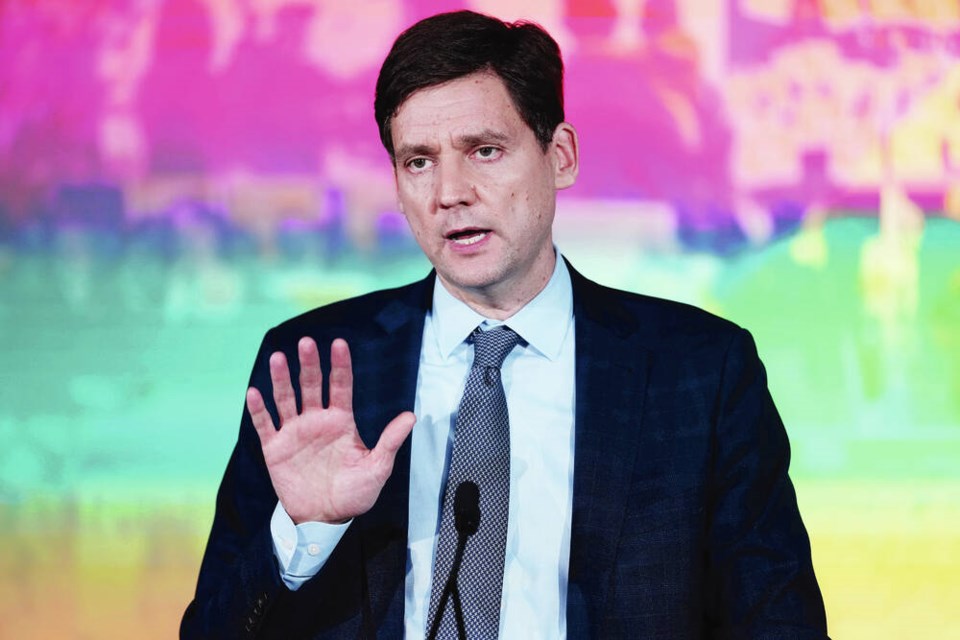The first hint of the first whiff of humility crept into the voice of Premier David Eby on Tuesday, as he was peppered by reporters to account for the failure of his party’s election campaign, which cost the BC NDP their majority government on Saturday.
“I'm the leader of the party, I take responsibility for the message that we received from British Columbians that we didn't do well enough, that we need to do more, that they want us to do more,” he said.
“And it is obviously a tough message to hear, but I heard it. And my commitment is to take that message to Victoria in whatever configuration of MLAs has been sent to deliver on those priorities British Columbians want us to focus on.”
The election, said Eby, is a wake-up call “to deliver the basics” like health care, public safety, affordability and economic growth, he said.
But internally, there is already a more flattering version of the election story being passed around. It involves a mighty leader and a heroic band of BC New Democrats who stood up to the blue wave of conservatism and beat it back from the gates of government.
In this version, the election was a victory for the ages, because it preserved a minority NDP government from forces outside of its control — stupid voters who thought they were voting in a federal election, stupider voters who actually supported the BC Conservatives and a North American-wide shift to the political right that had little to do with British Columbia.
The description sounds amusing to hear from the outside of the political bubble. But it is an actual undercurrent right now as New Democrats reconstitute the political apparatus of the B.C. government.
The attitude is reminiscent of Hillary Clinton’s 2016 US presidential run, in which she described millions of Trump supporters as part of a “basket of deplorables.”
The description backfired. It insulted the many voters who were simply looking for change from an incumbent government, and who believed reasonable (though sometimes politically incorrect) things about immigration, the economy and the government’s future.
The BC NDP campaign never quite got as far as actually calling BC Conservative voters “deplorables.”
But it did spend the entire 28-day campaign calling the party, its candidates and its leader racist, homophobic, transphobic, science-denying, climate-denying, Islamaphobic, sexist, hateful, ignorant, laughable, Trump-supporting, American-culture-war-promoting, awful people unfit to put their name on a ballot, and a shameful consideration for any reasonable person to support.
Despite all of that, more than 888,245 British Columbians still voted for the Conservatives — representing 43.57 per cent of the popular vote. The party is only one seat behind the NDP, and two seats shy of a majority.
So what does that tell you about the NDP campaign, and the party’s view of the province?
The NDP have yet to offer an explanation, though Eby has admitted Rustad “spoke to the frustrations of a lot of British Columbians.”
Perhaps Rustad spoke more effectively to British Columbians because he was actually listening, whereas the NDP government was too busy dismissing.
Consider, when the first mayors and businesses began sounding the alarm about increased drug use, vandalism, crime and repeat offenders earlier this year linked to the decriminalization experiment, the Eby government dismissed them as fear-mongering and attempting to shame those with addictions.
When BC United and the Conservatives proposed involuntary care for those with severe addictions, the NDP accused them of wanting to warehouse sick individuals.
When the Conservatives pitched an “axe the tax” campaign on the carbon tax this spring to ease affordability concerns, the NDP accused them of denying climate change.
When BC United and Conservative MLAs highlighted repeat closures of emergency rooms in rural B.C., the NDP accused them of failing to acknowledge the complexity of the problem and the successes already put in place on health-care recruitment.
And so on. On major issues, an instant refusal to hear concerns by the government. And on them all, eventually, a panicked reversal and flip flop by the NDP just before the election.
On Tuesday, Eby came close to admitting the NDP is electorally hard-of-hearing.
“When I reflect on what people told me both during the campaign and through their vote it’s that they are profoundly concerned about our health-care system, they want their ERs open and running, they want their family doctor, and anything less is unacceptable,” he said.
“That when it comes to their downtowns they want to feel safe with their kids going downtown. When they run a business downtown they don’t want to be dealing with someone struggling with a brain injury, mental health issue, an addiction. That’s not their business. Their business is to sell whatever it is that they’re selling.
“And so that’s a message that I got loud and clear, and I think that John Rustad spoke very effectively to British Columbians about those frustrations and that’s a lesson that I take that we didn’t do enough and we’ve got to do more to make sure that we’re supporting those kinds of communities, those kinds of strong public services that people are looking for, and we’re going to do that.”
We’ll see if New Democrats actually embrace that change, or are simply paying lip service to the idea.
Perhaps Rustad spoke more effectively to British Columbians because he was talking to people, while New Democrats, and their made-up internal stories of success, are still talking down to them.
Rob Shaw has spent more than 16 years covering B.C. politics, now reporting for CHEK News and writing for Glacier Media. He is the co-author of the national bestselling book A Matter of Confidence, host of the weekly podcast Political Capital, and a regular guest on CBC Radio.





